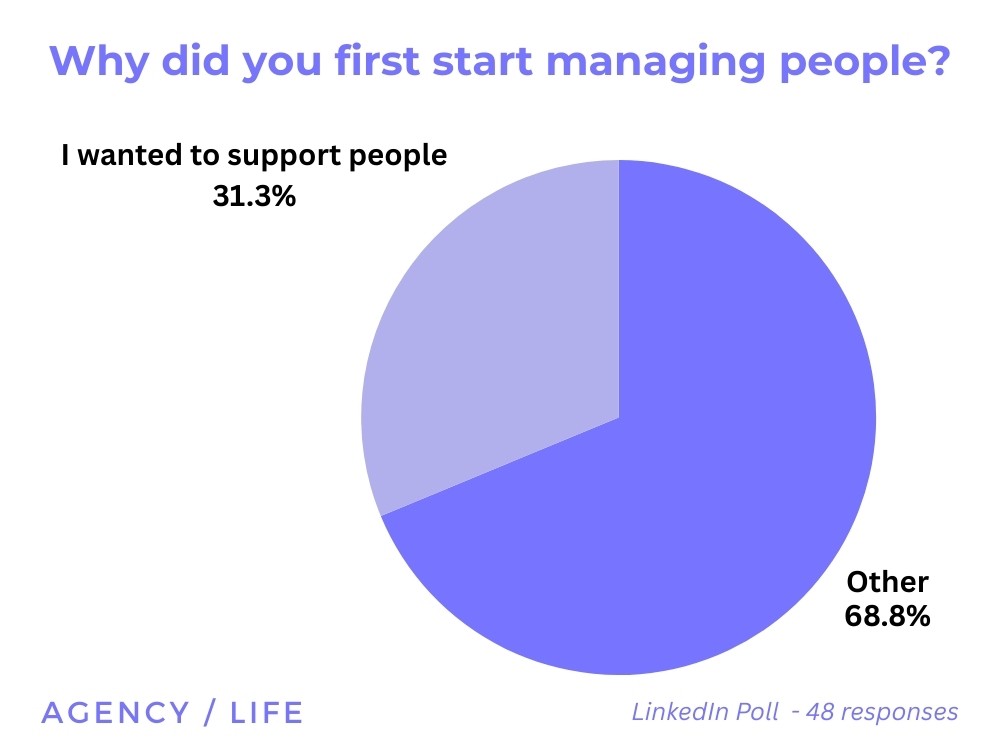In July 2016, I had the chance to progress again and step into a Senior Consultant role within my department. It was the next logical step (or only step), and I became responsible for the success of other people, rather than just my own clients and work.
Almost overnight, my priorities had to change and before I knew it there was a small team looking to me as their “boss”.
No real training. No previous experience. And no confidence in what I was meant to be doing.
I wanted to run for the hills.
I’ve since learned that I wasn’t alone – and it’s a huge problem in businesses across the UK.
A 2023 survey by the CMI and YouGov found that 82% of people became managers without any formal training. Even more revealing, a quarter of them were in leadership roles.
These “accidental managers” are particularly rife in agency environments, where career progression often blurs into people management, whether you’re ready or not.
I ran a quick poll on LinkedIn to see how widespread this is, and the majority of respondents said they first started managing people at an agency for a progression opportunity, promotion, or simply because they fell into it.

It shouldn’t be a surprise then, that the people on both sides of the management equation feel the strain.
I’ve seen firsthand the impact this can have on an agency’s culture, team wellbeing, staff retention, and pretty much everything else related.
Managers feel overwhelmed and underprepared, with many wishing they could step back into their previous role or quietly evaluating their options. Meanwhile, the people led by accidental managers can feel unsupported, frustrated, and disengaged, with their eyes on the nearest exit.
Don’t believe me? That same CMI survey found that 50% of people who rated their manager as ineffective were planning to leave in the following 12 months, and a third of the managers were getting ready to exit too.
But it doesn’t have to be this way. Whether you’re a new manager, a senior leader making key decisions, or part of an agency looking to build a healthier management culture, there are practical steps you can take to prevent this.
I learned the hard way and these are some of the biggest lessons for those thinking about their progression, new and existing managers, and agency leaders.
Don’t do it
The best advice I can give is don’t become a manager unless you genuinely want to and you see it being part of your long-term plans. It’s not just a promotion, it’s a completely different job, with new skills and a very different type of pressure.
If you’re happier deep in your craft, that can be just as valuable. You don’t owe anyone a move into management, and just as quickly as those new responsibilities can be handed to you, they can be taken away if it’s not the right fit.
That being said, managing people can be one of the most rewarding parts of an agency job and I’m so glad it’s something I fell into. It’s hard work, so do it because you want to, not just because it’s expected or what the next step “should” be.
Routes for progression
With that in mind, agencies today really need to consider routes for progression that don’t rely on managing people. Whether it’s senior specialist roles, lead consultants, or something else, there are meaningful ways to develop and reward growth that allow top contributors to stay close to the actual work.
Not everyone wants to lead a team, and pushing someone into people management can lead to disengagement for both the manager, and the team they didn’t really want to manage in the first place.
What got you here, won’t get you there
The skills that got you into this new role as a manager won’t automatically translate into success now. Accidental managers are usually promoted because they’re high performers, great at hitting deadlines, solving problems, and delivering results. But those same strengths could actually be an issue when it comes to overseeing a team.
Management requires an entirely different skillset, like delegation, coaching, listening, feedback, and letting others do the legwork. That shift doesn’t happen overnight, and without support, new managers often default to doing what they know best, like jumping in to fix things and unintentionally demotivating your direct reports.
The hidden burnout
Accidental managers often suffer in silence. They’re expected to manage people, deliver client work, attend more meetings, and stay across everything that’s happening on their team. That’s like two full-time jobs rolled into one, and it’s a fast track to burnout.
Because the move into management is seen as a reward, people often feel like they should just be grateful and get on with it. But behind the scenes, many can feel like they’re failing at both roles, pulled in all directions, unsure where to focus, and afraid to ask for help in case it looks like they’re not coping.
If you’re not on top of this as a leader, managers can burn out quietly and disengage completely, or quit.
You need support too
Many new managers can feel like they have to prove they’re “ready”. But the reality is, management is a skill that needs time, support, mentorship, and feedback like any other.
No one expects a brand new consultant or strategist to be brilliant on day one, but people do expect managers to instantly know what to do given their new title (and salary). A lot of people will try to figure things out themselves, but there are risks to yourself and the company if you get it wrong.
Don’t be afraid to ask for help or admit what you don’t know. It’s expected, trust me.
Invest in yourself
If you’re serious about people management in the future, don’t wait until you’re handed a team to start learning how to manage one. There’s so much you can do in the background, whether that’s books, podcasts, newsletters, or speaking with people who’ve done it before.
It’s not about ticking a box when it comes to formal training, but slowly building the awareness and tools you’ll need when the time comes. You’ll handle pressure better and step into managing people with your eyes wide open.
Invest in yourself and take ownership of your own development early.
(No affiliation, but if you’re not already aware of The New Leader by Paddy Moogan, the weekly newsletters and free resources are hugely valuable. I only wish something like this existed when I first started out).
Waiting in the wings
If someone does show an interest in managing people, get them ready well before the agency needs them. That means early exposure to what the role involves, shadowing experienced managers, mentoring juniors, some foundational training, and gradual responsibilities.
But please, don’t spend money on intensive training and qualifications, or expect people to sit through hours of meetings whilst their client work potentially suffers.
Keep them engaged and developing in the background, but only if there’s a realistic end goal.
Rule of five
A good rule to aim for is that no single person should manage more than five people directly. Beyond that, it’s basically a full-time job and becomes much harder to coach, support, and stay connected to each person’s needs and development. Not to mention the impact on billable work, assuming these managers will have their own client and department responsibilities too.
Stretching managers too thin ends up backfiring on everyone. I introduced this too late at a previous agency and my own rule meant that I needed five or six new managers overnight, with no time for training. The sooner you adopt this, the more likely it will be that you have the right balance and structure as you grow, rather than trying to fix it later.
People = product
In a lot of agency settings, especially service-based ones, your people are the product. There’s no platform or tech to sell, just a team to deliver the work.
Making sure you have the right managers taking care of them isn’t a “nice to have”, it’s business critical. Imagine working in a manufacturing company and those in charge of quality control don’t really care, or being in a high risk job and the health and safety team are unprepared. It might sound extreme, but that’s what it’s like when agencies don’t take this seriously.
Treat people management as a core function, not a soft skill. Otherwise, it will quickly become a quality issue that affects client outcomes, delivery, and trust.
Culture is caught, not taught
As a manager, your own behaviour sets the tone. How you handle pressure, communicate, and show up day-to-day will shape team culture more than any handbook ever will.
People learn what’s allowed by watching what’s tolerated, especially from their manager or those above them in the hierarchy.
You don’t need to be perfect (as much as some might expect that), but you do need to be consistent. If you want your team to be open, accountable, and honest, it starts with you.
Bite the bullet
One of the hardest parts about managing people is facing up to the things you’d rather avoid, like giving difficult feedback, having uncomfortable conversations, or calling something out rather than letting it slide. But putting it off never makes it better.
Avoidance sends a message too, that certain behaviour is tolerated, that standards are flexible, or that silence means approval.
This doesn’t mean being blunt or harsh. Clarity is kindness, and part of your responsibility as a manager is being willing to say the thing that needs to be said, even if it’s awkward.
Friend to manager
When you’re promoted within a team, relationships change. It’s normal, but not always easy.
You could end up managing people you class as friends and used to vent at the pub about your own manager with, then suddenly, someone might be doing the same about you. I remember when I was first promoted into a director role when my last agency was still small with very few managers, and the running joke was to stop talking around me because “management is listening”.
Acknowledge the shift, don’t fight it. It’s important to accept that some things will be different, and you can still care about people without having to be their mate.
Protect your time
This one’s especially for new managers or those stepping into a more senior role. Don’t overcompensate by trying to be available all the time. You’ll run out of steam fast and it’s not sustainable.
The worst thing I used to hear (a lot) with a large team was “I know you’re really busy, but…”, and I’d go out of my way to show I wasn’t too busy to talk, listen, or help.
Instead, set boundaries, delegate, and build trust. Your role isn’t to solve every problem personally, and protecting your time will protect your team.
Manage with empathy
People will forget what you did or said, but they will always remember how you made them feel. This is especially true in high-pressure environments like agencies, where emotions and client demands run high.
The best managers lead with empathy. They’ve more than likely been in the exact same shoes as their direct reports or team, and they should remember what it felt like to be under pressure or in need of some support.
Treat people how you would’ve wanted to be treated should be chapter 1 in every “new manager” handbook. Empathy and understanding will go further than authority ever will.


